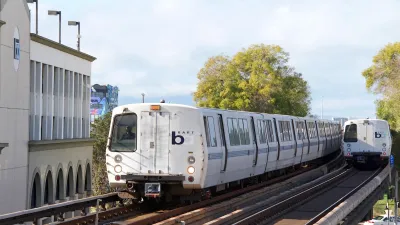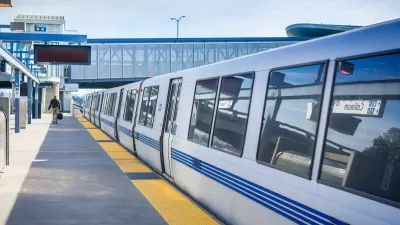Today marks the 40th anniversary of the opening of the Bay Area Rapid Transit (BART) system. The "first in a new generation of American rail systems" when it was built, BART now faces the challenges of declining health and keeping up with the times.
Michael Cabanatuan reports on the history and triumphs of the Bay Area's subway system, which just completed its busiest month ever, and the challenges it faces as it enters its fifth decade of service.
When the first segment of the system opened in 1972, after 8 years of construction, it was the the first new rail mass transit line to be constructed in the United States in 60 years. With "slant-nosed, computer-controlled trains, automated ticket machines and
fare gates and lightweight aluminum cars with carpeted floors and cloth-covered, cushioned seats," Bart was considered "a model for the rest of the nation," said Mike Healy,
who served as BART's chief spokesman from 1971 to 2004.
"As BART zips past 40, it faces a number of challenges," notes Cabanatuan. "Modernizing
and maintaining the system is critical, [Metropolitan Transportation Commission spokesman Randy] Rentschler said. After years of
searching for funding, the transit agency is buying a new fleet of
trains. But the agency also needs to replace its automated train-control
system and make improvements to increase the capacity of the original
72-mile 'core' of the system."
"Everyone loves BART, and everyone
wants BART," Rentschler said. "BART is still expanding, but what it
really needs to do is work on rebuilding and improving its core,
increasing its capacity."
FULL STORY: BART, at 40, looks to build on triumphs

Alabama: Trump Terminates Settlements for Black Communities Harmed By Raw Sewage
Trump deemed the landmark civil rights agreement “illegal DEI and environmental justice policy.”

Planetizen Federal Action Tracker
A weekly monitor of how Trump’s orders and actions are impacting planners and planning in America.

The 120 Year Old Tiny Home Villages That Sheltered San Francisco’s Earthquake Refugees
More than a century ago, San Francisco mobilized to house thousands of residents displaced by the 1906 earthquake. Could their strategy offer a model for the present?

San Francisco Opens Park on Former Great Highway
The Sunset Dunes park’s grand opening attracted both fans and detractors.

Oregon Legislature to Consider Transit Funding Laws
One proposal would increase the state’s payroll tax by .08% to fund transit agencies and expand service.

Housing Vouchers as a Key Piece of Houston’s Housing Strategy
The Houston Housing Authority supports 19,000 households through the housing voucher program.
Urban Design for Planners 1: Software Tools
This six-course series explores essential urban design concepts using open source software and equips planners with the tools they need to participate fully in the urban design process.
Planning for Universal Design
Learn the tools for implementing Universal Design in planning regulations.
Clanton & Associates, Inc.
Jessamine County Fiscal Court
Institute for Housing and Urban Development Studies (IHS)
City of Grandview
Harvard GSD Executive Education
Toledo-Lucas County Plan Commissions
Salt Lake City
NYU Wagner Graduate School of Public Service





























